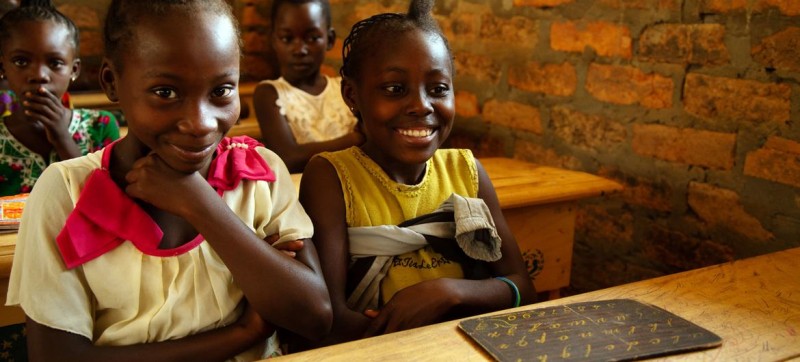UN fund reports ‘solid results’ empowering girls and boys in crises with opportunity of quality education
Girls in the Jean Vcolmomb school in Bangui, Central African Republic. On Tuesday, Education Cannot Wait (ECW), the United Nations global fund for education in emergencies and protracted crises, issued its Annual Results Report, which revealed that despite global upheaval, the fund and partners have continued to expand their response. The Report indicates that ECW investments have reached close to 7 million children and adolescents – 48.4 per cent of whom are girls – since becoming operational in 2017. Moreover, of all children reached by ECW’s investments to date, half are girls, and 43 per cent are refugee or internally displaced children. Last year, ECW reached 3.7 million students across 32 crisis-impacted countries, 48.9 per cent were girls. An additional 11.8 million students were reached through the fund’s COVID-19 intervention programmes. These schemes have brought the total number of children and adolescents supported by COVID-19 interventions to 31.2 million, 52 per cent of which are girls. Yasmine Sherif, Director of Education Cannot Wait, reflected on the progress made by the fund: “ECW’s solid results in our first five years of operation are proof of concept that we can turn the tide and empower the most marginalized girls and boys in crises with the hope, protection and opportunity of quality education.” In terms of resource accessibility, last year ECW mobilized a record-breaking $388.6 million. Total contributions to the ECW Trust Fund therefore top $1.1 billion.Results to Date
“Quality education is the key to achieving all #SDGs & #HumanRights. It is the very foundation & that is why it is so important that we give the new #ECWResults Report & the #UN-SG’s @TransformingEdu Summit the attention it deserves.” ~@YasmineSherif1 at @UN's Noon Press Briefing pic.twitter.com/SVmeZlAo09
— Education Cannot Wait (@EduCannotWait) August 23, 2022
Action Items
The report’s results were released in the wake of shocking new estimates issued by ECW in June 2022, which revealed that worldwide, 222 million students are in urgent need of educational support. This includes 78.2 million who are out of school and 119.6 million who are in school but not achieving minimum competencies in mathematics and reading.
“While progress is being made, we still have a long way to go,” said Gordon Brown, UN Special Envoy for Global Education.
The ‘Education Cannot Wait’s High-Level Financing Conference,’ will take place in Geneva in February 2023. It will be hosted by Switzerland and Education Cannot Wait – and co-convened by Germany, Niger, Norway and South Sudan – through the 222 Million Dreams campaign. The Conference will call on individuals and institutions, in the private and public sectors, to make substantive funding contributions to ECW.
Ms. Sherif said, “we urge governments, businesses, and philanthropic actors to make substantive funding contributions to ECW to help turn dreams into reality for children left furthest behind in crises.”
Key Trends
According to the report, conflict, forced displacement, climate-induced disasters and the compounding effect of the COVID-19 pandemic have fueled an increase in education emergencies. Funding appeals reached $2.9 billion in 2021, compared with $1.4 billion in 2020. While 2021 saw a record-high $645 million in education grants given – the overall funding deficit spiked by 17 per cent. The growing funding deficit signifies a worrying trend in resource shortages.
Annual Results Report Highlights
- More ECW grants are measuring improved levels of academic and/or social-emotional learning; 53 per cent of grants that measure learning levels showcase solid evidence of increased learning levels compared to 23 percent of grants active in 2020
- The share of children reached with early-childhood education (ECE), and secondary education increased substantially. Among all children reached by ECW: the share reached for ECE increased from 5 percent in 2019 to 9 per cent in 2021; the share reached in secondary education increased from 3 percent to 11 per cent in the same period.
- 92 per cent of ECW-supported programmes reporting data demonstrated an improvement in gender parity
- More girls and boys are completing their education and/or transitioning to the next grade/level, with a weighted completion rate of 79 per cent and transition rate of 63 per cent
- Close to 27,000 teachers (52 percent female) were trained and demonstrated an increase in knowledge, capacity, or performance in 2021
- Over 13,800 learning spaces are now featuring mental health and/or psychosocial support activities and the number of teachers trained on mental health and psychosocial support topics has doubled in 2021, reaching 54,000.




Comments are closed.